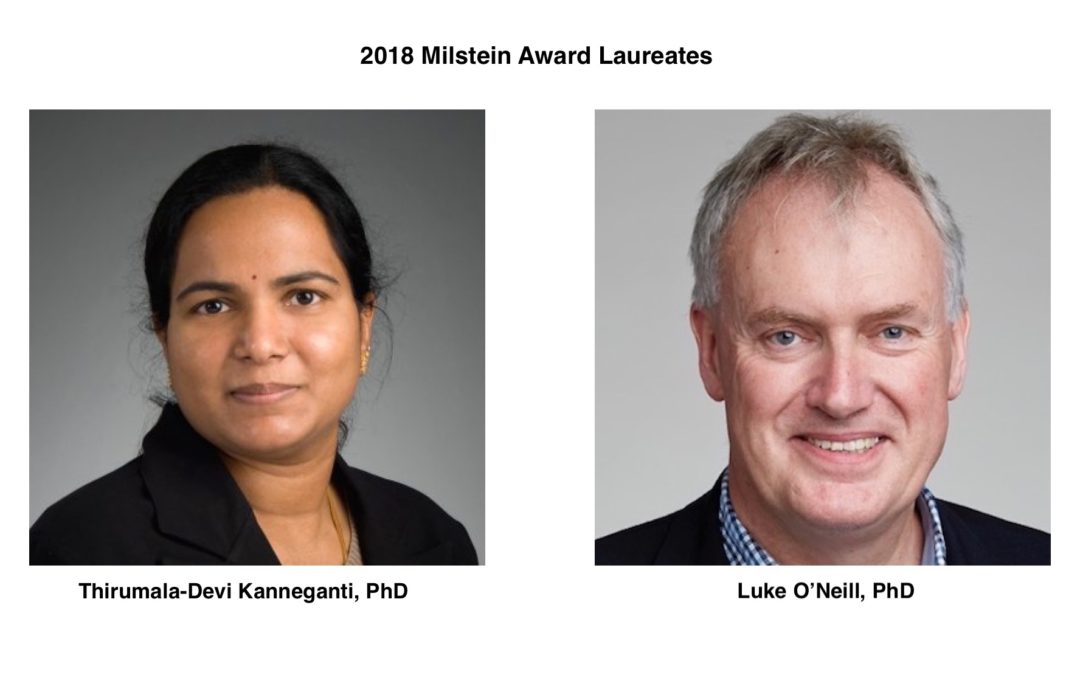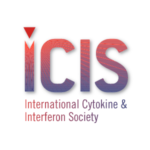The ICIS recognizes two world leaders in deciphering the role of innate immunity in the host immune response
ORADELL, NJ., May 8, 2018 –The International Cytokine and Interferon Society (ICIS) announced today that the Seymour and Vivian Milstein Award has been bestowed on two world leaders in deciphering the role of innate immunity in the host immune response. Thirumala-Devi Kanneganti, PhD, and Luke O’Neill, PhD, will share the 2018 Seymour and Vivian Milstein Award for Excellence in Cytokine and Interferon Research (“The Milstein Award”). The 30th “Milstein Award” ceremony will be held at Cytokines 2018, the 6th Annual Meeting of the International Cytokine & Interferon Society on Saturday, October 27, in Boston, USA. The Milstein Award recognizes achievements by biomedical research scientists who have made outstanding contributions to cytokine and interferon research, either in a basic or applied field. “This year the prestigious Milstein Award is presented to two scientists who have made major advances in understanding how our bodies recognize and respond to invasion by pathogens, and how this response can go wrong. The discoveries of Dr. Kanneganti and Dr. O’Neill are of profound clinical benefit to the treatment of major diseases in both immunity and cancer,” said Dr. Nancy Reich Marshall, President of the ICIS.
Interferons and cytokines are involved in all biological processes and play a critical role in the development and progression of many diseases including cancer, viral diseases, and autoimmune disorders such as multiple sclerosis, rheumatoid arthritis, and lupus. Indeed, interferon has been called “evolution’s first and perhaps most important invention for…survival…”1
This year’s Milstein Award laureates are:
Thirumala-Devi Kanneganti, Vice Chair of the Immunology Department and the Rose Marie Thomas Endowed Chair at St. Jude Children’s Research Hospital in Memphis, Tennessee, in recognition of her numerous contributions and impact on our understanding of immunology, inflammation, cytokine signaling and host-pathogen interactions. The field of innate immunity and inflammation has emerged as a central focus in biomedical research in recent years, and Dr. Kanneganti’s contributions are at an outstanding level and at the forefront of this research area.
Luke A.J. O’Neill FRS, Professor & Chair of Biochemistry in the School of Biochemistry and Immunology, Trinity Biomedical Sciences Institute at Trinity College Dublin, Ireland, in recognition for his seminal contributions to our understanding of the molecular basis of inflammation and immunity. He is one of the key figures whose research and publications are responsible for the major increase in interest amongst immunologists in innate immunity over the past 20 years and is listed by Thompson Reuters/ Clarivates in the top 1% of immunologists in the world, based on citations per paper.
###
For 30 years, the Milstein Awards have represented the pinnacle of scientific achievement in interferon and cytokine research and are conferred each year by the International Cytokine & Interferon Society at a special event during its annual meeting. The Milstein family — Vivian, her late husband Seymour, their son Philip and their daughter Connie — are well-known philanthropists in the United States and abroad. For more than 50 years they have provided essential support for institutions and organizations at a time when funds from government agencies have been drying up.
Seymour Milstein’s early insights into the critical importance of interferons led him to Sidney Pestka, M.D., one of the scientists at the forefront of interferon research. Seymour Milstein’s interest in fostering continued investigations in this emerging field, and the Milstein family’s tradition of support for organizations dedicated to patient care and scientific research, motivated him and his wife Vivian to establish The Milstein Awards in 1988, two years after interferon was first approved for the treatment of hairy cell leukemia.
Since that time, it has been widely recognized that interferons and the larger class of cytokines play critical roles in the development and progression of many major diseases including cancer, viral diseases such as hepatitis and influenza, and autoimmune disorders such as multiple sclerosis and lupus. Most importantly, in the context of the Milstein Award’s scope, the three most recent honorees have contributed tremendously to the treatment of disease and improvement of human health, exemplifying the goals of the Milstein Awards.
The Milstein family also supports The Milstein Young Investigator Awards to recognize the work of individuals who have made an impact on interferon and cytokine research early in their careers, and The Milstein Travel Awards to give those who may not otherwise be able to attend the Annual Meeting of the ICIS an opportunity to share the most current cytokine and interferon knowledge with peers around from the world.
About ICIS
The International Cytokine and Interferon Society, based in Oradell, NJ and Regensburg, Germany, is a non-profit organization devoted to cytokine, interferon, and chemokine research in the fields of cell biology, molecular biology, biochemistry, and pre-clinical and clinical drug development. The ICIS provides a forum for sharing knowledge and encourages investigations that will lead to the prevention, diagnosis and treatment of diseases that impact humanity. ICIS members’ research has led to significant breakthroughs in understanding and treating cancer, inflammatory diseases such as rheumatoid arthritis, viral diseases such as hepatitis and influenza, and autoimmune disorders such as multiple sclerosis and lupus.
Cytokines 2018 will be held 27-30 October, 2018 at the Westin Boston Waterfront in Boston, USA bringing together leading investigators across many different research disciplines in the field of cytokine biology that impact all aspects of medicine. One aim of the meeting is to bridge the gap between the scientists performing basic research on molecular and cellular mechanisms of immune cell activation and function with those working to develop this knowledge into novel therapies.
Abstract Topics:
- Cytokine regulation
- Innate immunity
- Cytokines in Allergy & Th2 Immunity
- Cytokines in skin inflammatory diseases
- Mucosal immunity
- Autoinflammation & Autoimmunity
- Anti-cytokine therapy
- T cell differentiation & function
- Cytokines in cancer development & antitumor immune therapy
Deadline is 1 June for Abstract Submission, Travel Award and/or Young Investigator Award Applications
Contact: Joan Oefner, [email protected]
1 J. E. Darnell Jr., Laboratory of Molecular Cell Biology, The Rockefeller University, New York, NY (Interferon: The 50th Anniversary, 2007)
![]()


